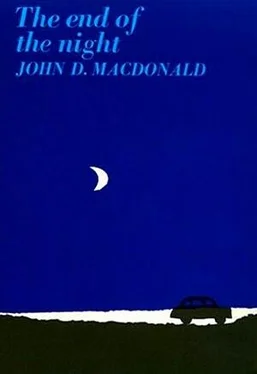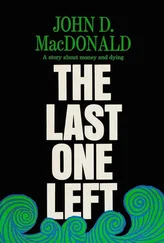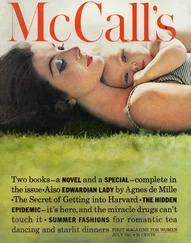“Now that wasn’t polite, man,” Sandy said.
A faraway jet made a faint ripping sound. Becher stood in his own small black pool of shadow. He was sweating heavily. The situation was changing. He had triggered it. I could feel a coiling and turning in my stomach.
Shack walked slowly back to the tailgate, opened it, slid a heavy cardboard carton out onto the tailgate.
Horace turned and saw him and said, with automatic authority, “Careful with that! That’s a special order. Imported Italian tile for a bar top.”
Shack picked the box up in his arms. With a great effort so smoothly controlled that it looked effortless, he swung it up over his head and launched it in a high arc. It turned slowly in the hot, white sunlight and landed with a jangling smash on the rocks. The box ruptured. Bright shards of tile clattered on the stones.
That changed it, also. It was a symbol. Becher probably sensed the way things were changing and accelerating, and so he said, “I can write it out for you. The loan of the car and the money. You’ll have something to show.”
Nan yawned like a cat. Sandy picked up a few stones and threw them carefully, one at a time, until the fourth one struck and broke an undamaged tile which had slid out of the broken box.
It was all growing and changing. We were all getting closer to the edge of something. I can remember a time very much like that time with Becher. I was fourteen. There were five of us, all of an age. On a Saturday evening in August we went on our bikes out to the Crozier place and up the long drive to the dark empty house. They had gone to their place in Maine for the summer. Paul Beattie, my best friend at that time, had a hopeless crush on Marianne Crozier. Our idea, riciculous, mischievous and slightly romantic, was to break in and find which room was Marianne’s, and leave there a mysterious message from an anonymous admirer.
We got in through a cellar window. It was scary work. We had come prepared, each of us with a flashlight. The electricity was turned off. We moved slowly in a taut group, whispering. From time to time we would stop and listen to the emptiness. It was a huge old place, full of ghosts and creakings. By the time we had located Marianne’s room, we had become much bolder, and had begun to show off, each in his own way, for the others in the group. Fats Carey bounced up and down on Marianne’s bed, with obscene commentary. Gussy Ellison found out that the water was turned on, and hurried from one bathroom to the next, turning on every faucet, stoppering every sink and tub. The constant roar of water gave us courage instead of alarming us. Kip McAllen began to pile the bed of Paul’s beloved with the contents of bottles he found in medicine cabinets and on dressing tables. For a time Paul bellowed his indignation at this violation of the shrine, and tried to put a halt to all disorder, but soon be caught the spirit of anarchy.
It grew and blossomed with us. We ranged through the house, clumping up and down stairs, trying to outdo each other in acts of outrage, each yelling to the others to come witness this particular violation of decent behavior. When, at least three hours later, we pedaled away, trembling with reaction, laughing and hooting in a coarse way, each one trying to exaggerate his own guilt, we left ruin behind us — precious things ripped, smashed, smeared and degraded, books, mirrors, draperies, lamps, statuary, clothing. It was reported later in the paper that the water overflow had caused structural damage to the extent of fifteen thousand dollars, and the other damage was estimated at twenty-five thousand. There were editorials about vandalism. We lived in terror for a month. We got together and devised an alibi so intricate that it could not have survived ten minutes of intensive questioning. But we were never questioned. We all came from substantial families. A few weeks later three of us went off to private schools. Had we all stayed in Huntstown High, we might have given ourselves away.
I am trying to make this point: we did not go to the Crozier place to do forty thousand dollars’ worth of damage. We went on a romantic errand. We rode our sprocket-wheel steeds up there through the warm evening, noble as knights. When we left it was as though we had been through a brief and shocking illness. The violence was a cumulative thing, building upon itself.
I can remember the dreamlike way I climbed onto a chair and took down the saber hanging on Mr. Crozier’s study wall. I slid it out of the scabbard. It made a hissing sound when I swung it. There was a marble bust on a low table, the head and shoulders of a bearded man. “Off with your head,” I whispered and swung with all my strength. The blade snapped off at the hilt. My hands stung. The bust rocked and fell, and the head split on the hardwood floor. It was all a hot excitement, a roaring release.
Now, not quite a decade later, I sat on my heels in hot country and felt it all building again, toward the crazed release.
Becher could not quite believe what was happening to him. On one level I believe he felt that it would all come to an end, and it would be a story for him to tell in the home office and out on the road. But on a more primitive level there was a knowing dread inside him. His color was bad. His mouth kept working. A man could stand like that in a pit of snakes, wondering how to communicate, how to appease yearning for invisibility.
Shack pulled the salesman’s suitcase out of the station wagon, dropped it on the ground, unzipped it. He pulled the clothing out, then stood up with a fifth of bourbon, half full. He uncapped it, took two long swallows, coughed and offered it to Sandy.
“Give it to Horace,” Sandy said. “He’s a nervous cat.”
Shack gave Horace the bottle.
“Chug-a-lug,” Sandy said.
“It’s warm,” Horace said faintly.
“Every drop, man. No stopping. Or you get some hard things to do. Drink it down, man.”
He looked around at us, licked his mouth, then made his try. He tilted it up, squeezing his eyes shut against the sun. The soft throat worked. The level went down. He almost made it. But his stomach rebelled. He staggered and went down to his knees. The bottle dropped and broke. He spewed up the contents of his stomach onto the hot stones and sand. He got up slowly when it was over and leaned against the car. His face was yellow-gray.
“You’re out of shape,” Sandy said. “You need exercise. Anybody got any ideas?”
“Somersaults,” Nan said. “They’re nice.”
“Somersaults — around the car,” Sandy said.
“I don’t think I...”
“You got some hard things to do, Horace. Come on!”
Shack drifted closer to him. Horace started. He found a soft place for his head. He went over sideways the first time. He did it right the second time. When he rolled into a sitting position, the stones bruised his back. He went slowly and laboriously around the car. He stopped, florid, shaking, gasping for breath. Sandy told him to go once around again. It took longer. As he was balancing, near Shack, to go over again, Shack booted him solidly in the rear and he went over very quickly, so quickly he rolled up onto his feet, staggering to find his balance. The back of his shirt was bloody.
“Do it every day and you’ll live longer,” Sandy told him. “Will you do it every day?”
“Yes, sir,” Horace said. There was no resistance in him. He had accepted humiliation, and there wasn’t much of him left, beyond a blind desire to please. His life had given him no tests of strength, no resource with which he could resist this nightmare in the high noon sun. He hoped to endure. That was all.
Nan was kneeling, pawing through the suitcase. She took out a toilet kit and opened it, took out a shaving bomb and pressed the button on top. A long worm of suds gouted onto the stones. She grinned at Sandy and at me.
Читать дальше







![Джон Макдональд - The Hunted [Short Story]](/books/433679/dzhon-makdonald-the-hunted-short-story-thumb.webp)


